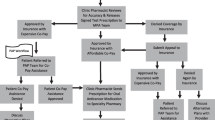Abstract
In recent years a paradigm shift towards a patient-focused rather than a disease-focused approach occurred in many health care systems. The pharmacy profession experienced an accordant development. The traditional drug-oriented services expanded towards patient-oriented services. In oncology, pharmacists established central services for compounding of cytotoxic drugs and offered therapeutic drug monitoring for critical substances. Pharmaceutical care concepts are now being introduced to optimize individual drug therapy. Pharmaceutical care aims at improving safety and therapeutic outcomes and consequently, the patient’s quality of life. These objectives imply a close relationship to supportive care. To achieve this, a multidisciplinary approach seems to be beneficial.



Similar content being viewed by others
References
Aaronson NK, Ahmedzai S, Bergman B, Bullinger M, Cull A, Duez NJ et al (1993) The European Organization for Research and Treatment of Cancer QLQ-C30: a quality-of-life instrument for use in international clinical trials in oncology. J Natl Cancer Inst 85:365–376
Alliance for Aging Research (1998) When Medication Hurts Instead of Helps: Preventing Medication Problems in Older People. Washington D.C.
American Federation of Clinical Oncologic Societies (1998) Access to quality cancer care: consensus statement. J Clin Oncol 16:1628–1630
American Society of Health-System Pharmacists (1996) ASHP guidelines on a standardized method for pharmaceutical care. Am J Health Syst Pharm 53:1713–1716
Berard CM, Mahoney CD (1995). Cost-reducing treatment algorithms for antineoplastic drug-induced nausea and vomiting. Am J Health Syst Pharm 52:1879–1885
Broadfield L (1995) Pharmaceutical care in oncology pharmacy practice: A method for using outcome indicators. J Oncol Pharm Pract 1:9–14
Cipolle RJ, Strand LM, Morley PC (1998) Pharmaceutical Care Practice. McGraw-Hill, New York Chapter 3:73–120
Dranitsaris G, Leung P, Warr D (2001) Implementing evidence based antiemetic guidelines in the oncology setting: results of a 4-month prospective intervention study. Support Care Cancer 9:611–618
Engstrom C, Hernandez I, Haywood J, Lilenbaum R (1999) The efficacy and cost effectiveness of new antiemetic guidelines. Oncol Nurs Forum 26:1453–1458
Freidank A (1999) Schemata zur Prophylaxe von Zytostatika-induzierter Emesis und Nausea. Krankenhauspharmazie 20:49–54
Hepler CD (1997) Pharmaceutical Care and Therapeutic Outcomes Monitoring. J Appl Therap 1:285–294
Hepler CD, Strand LM (1990). Opportunities and responsibilities in pharmaceutical care. Am J Hosp Pharm 47:533–543
Hoare D, Beer C (1995) Guidelines for the pharmaceutical care of cancer patients. Pharm J 255:841–842
Hon YY, Evans WE (1998) Making TDM work to optimize cancer chemotherapy: a multidisciplinary team approach. Clin Chem 44:388–400
Inhaltskatalog Onkologische Pharmazie (2000). http://www.ifahs.org/apotheker/inhaltskatalog.html
Kennie NR, Schuster BG, Einarson TR (1998) Critical Analysis of the Pharmaceutical Care Research Literature. Ann Pharmacother 32:17–26
Lazarou J, Pomeranz BH, Corey PN (1998) Incidence of Adverse Drug Reactions in Hospitalized Patients. JAMA 279:1200–1205
Liekweg A, Eckhardt M, Taylor SCM, Erdfelder E, Jaehde U (2003). Patient satisfaction with information on cancer treatment – A useful outcome measure for pharmaceutical care? Pharm World Sci, submitted for publication
Lindley CM (1994). Pharmaceutical Care: The Chemotherapy Patient. US Pharmacist 56–78.
Mobach MP (2001) From the laboratory to pharmaceutical care research—Part I. Pharm World Sci 23:205–209
Quality Standards for the Oncology Pharmacy Service (2001) 3rd ed. Onkopress, Oldenburg, Germany
Todd WE, Eichert JH, Toscani MR (1997) Disease Management—Building a Solid Foundation. Dis Manage Health Outcomes 1:26–31
Working Party Report (1997) Pharmaceutical care of cancer patients in the community. Pharm J 258:54–58
Author information
Authors and Affiliations
Corresponding author
Additional information
Presented as an invited lecture at the 15th International Symposium Supportive Care in Cancer, Berlin, Germany, June 18–21, 2003
Rights and permissions
About this article
Cite this article
Liekweg, A., Westfeld, M. & Jaehde, U. From oncology pharmacy to pharmaceutical care: new contributions to multidisciplinary cancer care. Support Care Cancer 12, 73–79 (2004). https://doi.org/10.1007/s00520-003-0539-4
Received:
Accepted:
Published:
Issue Date:
DOI: https://doi.org/10.1007/s00520-003-0539-4




